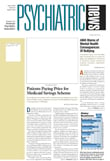What’s the best strategy for achieving our advocacy agenda? How do we get federal parity legislation, stop psychologist prescribing, and increase funding for psychiatric services? No matter how active our members are or hard working our staff, these are not things that we can accomplish on our own. We need allies.
Fortunately, there are other groups that share our interests in protecting the mental health and improving the psychiatric care of the citizens of the United States. The best allies, though, are often found closest to home. In our case, the first place we ought to look is to the rest of organized medicine. The American Medical Association, state medical societies, and other specialty groups have been invaluable collaborators with us over the years on countless advocacy efforts. And we need their help now more than ever.
These thoughts come in the wake of my visit, a few weeks ago, to the AMA’s annual House of Delegates meeting in Chicago (Psychiatric News, July 19; see related story on page 1). I accompanied the Section Council on Psychiatry, composed of delegates and alternates from APA and the American Academy of Child and Adolescent Psychiatry, soon to be joined by a delegate from the American Academy of Psychiatry and the Law. As other psychiatric subspecialty organizations (several of which are members of an AMA-related specialty society group) reach appropriate levels of AMA membership among their own members, they too will be entitled to representation and may apply for seats in the House of Delegates. There is also a Psychiatry Caucus, comprising all AMA delegates and alternates who are psychiatrists, many of whom represent their state medical societies or other specialty organizations.
In some medical venues, psychiatrists may feel out of the mainstream, though I think that unfortunate phenomenon is becoming less common as we draw closer to our medical roots. At the AMA meeting, however, psychiatry is in the thick of things. Our delegation, led by Jay Scully, M.D., is large and influential, and has worked hard over the years to build bridges and win allies among other delegate groups. Thus, this meeting saw the House of Delegates reassert its rejection of psychologist prescribing and urge all state and specialty groups to form a common front against psychologists’ legislative efforts. As delegates expressed their concern about the bureaucratic burdens that will derive from the rules embedded in the new HIPAA regulations on medical privacy and data transmission, they nevertheless—at APA’s urging—reaffirmed their commitment to the principle of maintaining the confidentiality of medical treatment. These examples represent only a few of the many issues with which our delegation was actively involved.
Why does all this matter? Of what concern is it to us whether the AMA or state medical societies support the positions we take? The answer is that, if our advocacy efforts are to be something more than quixotic crusades, it is critical that we have the support of our colleagues in the rest of medicine. Psychiatrists represent somewhere between 5 percent and 10 percent of practicing physicians in the United States. When our efforts are reinforced by our medical colleagues, our strength is multiplied 10- to 20-fold. In some states with few psychiatrists and small APA district branches, the only effective advocacy voice for any part of the medical profession is the state medical society, and only with the help of our medical colleagues can we have any chance of success at all.
Moreover, the support of the rest of medicine is often essential for the credibility of our arguments. In New Mexico the district branch’s opposition to psychologist prescribing was severely undercut when the state medical society—for inadequate reasons of its own—declined to oppose the psychologists’ bill. What were New Mexico psychiatrists to respond when asked by the governor and legislators a question that went something like this: “If this bill would allow psychologists who are not properly trained in medicine to engage in medical practice, and thereby endanger patients as you say, then why is the state medical society not opposing it?” Even the assistance of the state’s family practitioners, who stood with their psychiatric colleagues, was insufficient to overcome the setback associated with the defection of the medical society.
If this all makes sense to you, there are some very important things that you can do to reinforce the alliance between psychiatry and the rest of medicine. Indeed, only you can help us accomplish that goal. Join the AMA and your state medical society. There’s nothing like having proportionate representation of each state’s and the nation’s psychiatrists in these groups to motivate them to fight for those issues of greatest importance to us. If you have the time, don’t just be a member—be a vocal and active member. Write to your representatives in organized medicine to urge them to support issues affecting psychiatrists and their patients. Better yet, become one of those representatives yourself. The number of psychiatrists who are now or have recently been presidents of their state medical societies is a very heartening development and one that bodes well for the future.
Of course, we all face limits on resources and time. There are just so many dues bills we can pay, and just so many meetings we can attend. That is an argument, however, for making our dollars and our time count. I’d suggest to you that one of the best ways of doing that is by actively involving ourselves in the broader house of medicine. ▪

